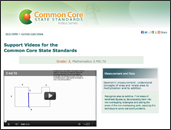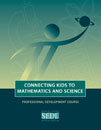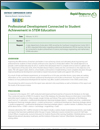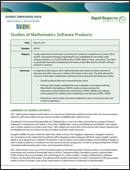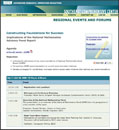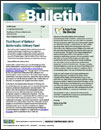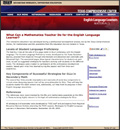SEDL's Free Publications for Mathematics and Science
Mathematics and Science
Our Most Popular Products in this Subject Area
Use the menu on the left to show additional products in this category.
|
SEDL Insights, Vol. 1, No. 4: Teaching Mathematics Conceptually (2014) Mathematics instruction in the United States has historically focused on procedures, facts, and algorithms. Because of that focus, mathematics instruction, in essence, becomes lessons in arithmetic and efficiency. While there are promising changes occurring in mathematics instruction, we still need to help both teachers and students develop a more conceptual understanding of mathematics. This issue of SEDL Insights helps educators shift from helping students memorize rules to facilitating a deeper understanding of mathematics concepts. |
|
Common Core State Standards Video Series: Mathematics (2012) The Common Core State Standards (CCSS) videos are designed to support states, schools, and teachers in the implementation of selected math standards. Each video is an audiovisual resource that focuses on one specific standard through examples and illustrations geared to enhancing understanding. |
|
Connecting Kids to Mathematics and Science (2012) This nine-session professional development course provides teachers in grades 4–8 with hands-on experience in integrating mathematics, science, and technology in the classroom. The course is designed for use by an experienced trainer or facilitator and is available online free of charge. |
|
Engaging Diverse Learners Through the Provision of STEM Education Opportunities: Southeast Comprehensive Center Briefing Paper, May 2012 (2012) Science, technology, engineering, and mathematics (STEM) are viewed as fundamental elements in preparing our next generation to compete in the 21st century economy. This brief examines how various states are seeking to improve access to STEM education opportunities for diverse learners to meet state and federal education priorities and funding requirements. |
|
Mosaic: An Integrated Approach to Mathematics, Science, Technology, & Language (2012) This K–5 supplemental instructional program provides lessons and resources that integrate math, science, and technology while supporting English learners and academic language skills. The program is available online free of charge. |
|
Rapid Response: Professional Development Connected to Student Achievement in STEM Education (2012) The Southeast Comprehensive Center at SEDL produced this resource in response to a request by a state department of education for information about professional development for teachers on student achievement in science, technology, engineering, and mathematics (STEM) education. |
|
Secondary Content-Area Literacy: Time for Crisis or Opportunity for Reform?: Texas Comprehensive Center Briefing Paper, Number 12 (2012) This brief examines the critical need to implement instruction at the secondary level around adolescent, or content-area, literacy. The challenge is to connect the teaching of literacy to the rest of the secondary education improvement agenda. |
|
Rapid Response: Studies of Mathematics Software Programs (2011) This resource was developed in response to a request for information regarding the use of the My Math Lab project and similar math software programs (i.e., Plato, Aleks, Math in Focus, and others), and information on the effectiveness of math software programs in practice. In response to this request, staff conducted web-based and hand searches of literature and other resources to obtain information on the topic. The staff selected for inclusion in this report mathematics software products based on the following criteria: Specific products that were requested by the client, products with studies available that were evaluated in accordance with the What Works Clearinghouse (WWC) evidence review protocol for elementary school mathematics interventions (WWC, 2009d) and evidence review protocol for middle school mathematics interventions (WWC, 2009e), and products for which studies have been published in peer-reviewed journals and in other publications. |
|
Constructing Foundations for Success: Implications of the National Mathematics Advisory Panel Report (2009) The objectives of this forum included understanding implications of key recommendations of National Mathematics Panel Report (NMPR), connecting key NMPR recommendations to current work and state initiatives, and developing strategies for coordinated, leveraged actions across state initiatives that address key recommendations. |
|
Southeast Comprehensive Center eBulletin, Volume 3, Number 3: Final Report of National Mathematics Advisory Panel (2009) Student effort matters! This is just one of the findings of the National Mathematics Advisory Panel in its 2008 report titled Foundations for Success—The Final Report of the National Mathematics Advisory Panel. This 120-page report addresses one central question: How can schools in the United States improve mathematics curriculum, instruction, assessment, teacher training and support so that all American students learn mathematics so that they can compete with students from other nations? In the report, the advisory panel discusses 45 findings and recommendations on key topics, such as instructional practices, materials, professional development, and assessments. The authors stress the importance of knowledgeable teachers, effective instruction, effective assessment, and the need for rigorous research in mathematics education. |
|
What Can a Mathematics Teacher Do for the English Language Learner? (2009) Based on a 2006 professional development session for math and ESL specialists, this online interactive document includes teaching strategies for ELLs at various levels, critical components to include when designing math lessons for ELLs, and a list of relevant resources. |


